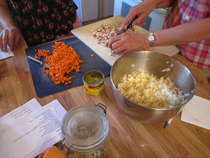Liturgically speaking, summer is all “ordinary time.” It’s a break after the Lent/Triduum/Easter seasons that concluded with the feat of Pentecost. That’s fine with me. Summer is full enough without more events and expectations. Besides, I love “ordinary” time. It gives us breathing room to discover just how extraordinary ordinary is.

PHOTO: Mary van Balen
There is a Latin phrase that provides wisdom for living and praying the “ordinary time” moments in our lives: Age quod agis or “Do what you’re doing.” Finding the origin of the Latin phrase was impossible. Finding its use was easier. It appears in things as diverse as the old western movie, Tombstone, Pope John XXIII’s Journey of a Soul, Saint Ignatius and Jesuit spirituality, and school mottos to name just a few.
Whatever you’re doing, do it with attention. Throw your whole self into it. It’s tempting to idealize this interpretation of the phrase, applying it to individual tasks. You know, if you’re folding laundry, well, concentrate on the laundry. Enjoy the smell and feel of clean clothes. Be grateful you have that neat stack.
On the other hand, such single-mindedness isn’t always possible and isn’t always the wisdom age quod agis offers at a particular moment. The recent family scene in the living room of my nephew and his young family comes to mind.
 He and his wife were busy folding loads of laundry and sorting it into piles for each of their four children. They were preparing for a month-long trip to visit both sets of grandparents and, in addition to that, camping for a week. In the midst of their preparations, they offered hospitality to a visiting aunt, which would be me. And of course, all four children were around, talking to their visitor and taking care of their own preparations—which may have included cleaning rooms and gathering books to take. I leave it to your imagination. Not a lot of time there to sniff the laundry.
He and his wife were busy folding loads of laundry and sorting it into piles for each of their four children. They were preparing for a month-long trip to visit both sets of grandparents and, in addition to that, camping for a week. In the midst of their preparations, they offered hospitality to a visiting aunt, which would be me. And of course, all four children were around, talking to their visitor and taking care of their own preparations—which may have included cleaning rooms and gathering books to take. I leave it to your imagination. Not a lot of time there to sniff the laundry.
Life and prayer are a communal endeavor. “What you’re doing” can be one thing or a number of things. Those young parents were taking care of laundry while answering questions, directing activity, and making me feel welcome. Their “what you are doing” was being good parents while welcoming the visitor. They gave it their all.
Same with us. We might be students, teachers, employees, parents, or members of a community (vowed or not). We might be children, arranging care for an aging parent. And while it would be nice to give ourselves completely to a solitary walk on the beach, listening uninterrupted to a symphony, or gardening quietly in our yard, life doesn’t always happen that way. It’s more likely a hodgepodge of activity.
What ordinary time says to me is that’s ok. No, not just “ok.” That’s the path to holiness. “Do what you’re doing.” No matter what that is in the present moment, it’s where we meet God.
We celebrate feast days of a number of saints in July who were good at this. While the lives of all these virtuous predecessors can speak to the holiness of living fully the ordinary, everyday life, Benedict (July 11), Mary Magdalene (July 22), Joachim and Anne (July 26), and Martha (July 29), hold a special place in my heart.

Watanabe Sado (1913-1996) Tokyo. Stencil print on rice paper.Hangs in the Gathering Place at the entrance to Sacred Heart Chapel at Saint Benedict’s Monastery, St. Joseph, MN
Benedict for his great Rule written with emphasis on community as a way to holiness and his understanding of humility, compassion, and care for one another as spiritual disciplines right up there with prayer and fasting. Flexibility was key then as it is now. Mary Magdalene for her courage and deep love of Jesus. Hers was the woman’s voice that first proclaimed the resurrection to others who were disinclined to believe her. Joachim and Anne (or if those aren’t their actual names, the parents of Mary) for being good parents. Enough said! Martha, who often gets a bad rap for hanging out in the kitchen when she could have joined the others at the feet of the teacher. She took care of the nitty-gritty and, as one who has spent countless hours doing that, surely heard most of what was said!
Happy summer. Courage! Age quod agis!
© 2019 Mary van Balen


